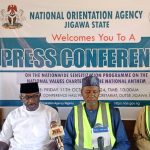By Dauda Muhammad Hadejia
In the bid to promote and achieve improved malaria and health outcomes within Jigawa communities, ACOMIN/ ATM Network recognizes the importance of the Primary Healthcare Service delivery and focused attention on the factors that will facilitate efficiency and effectiveness at that level through Effective prevention, diagnosis, treatment, and support services for infectious diseases such as HIV/AIDS, Malaria, Tuberculosis (TB) and others are crucial, especially for vulnerable populations and those in remote or underserved areas.
Briefing Journalist at separate media meetings, the program officers Civil Society in Malaria Control, Immunization and Nutrition ACOMIN Malam Awwal Ibrahim and Malam Abdul’aziz Ibrahim of the HIV/AIDS, Tuberculosis and Malaria ATM Network explained that, the prevalence rate of Malaria, HIV and TB infection are poverty related, with the poorest populations being most vulnerable due to lack of financial resources, access to information and quality education.
However, the Program Officers confirmed, that the community-led monitoring activities indicate that some challenges that hinder effective service provision still subsist, while the challenges include inadequate staffing, equipment shortages, regular stockouts of medical supplies, and high treatment costs.
Also, it has been observed that accurate and timely documentation is essential for effective healthcare delivery, but it is important to state that the communities and their leadership can and do play significant positive roles in resolving these problems.
According to the Managers, the Jigawa state community-Led Monitoring project being implemented by ACOMIN/ ATM Network has yielded the following successes this year.
- Engagement of the facilities health committees.
- Creation of synergy of working relationship between the health care workers and community members.
- CBOs support many projects where accomplished at the facilities and also many casual staff were deployed to other facilities.
- Through CBOs advocacies many activities were done at the facilities such as floor and roofing dilapidated were repaired, seating materials provided to the facilities, broken windows being repaired.
- CBOs are problem solving ( facility level teams monitor their performance, conduct a root course to identify obstacles to providing high quality Care and test solutions to overcome the PHCs.
- CBOs provide information from service user experiences on issues impacting the availability, acceptability, and quality of care to clients at facilities through CLMTs.
- CBOs to establish, strengthen, and sustain community members, leaders, and WDC to improve community led and community based service in delivery to the clients, CEI and community systems and responses during entry FGD and exit FGD activities.
The ACOMIN project Officer said the successful completion of the NFM 3 Malaria grant, warranted the Global Fund to approve another 3 years Malaria Grant for Nigeria, led by the National Malaria Elimination Programme.
The Officer mentioned that, the implementation of the grant is ongoing in 13 States of the federation, which includes Ogun, Delta, Osun, Kaduna, Kano, Kwara, Gombe, Yobe, Katsina, Adamawa, Taraba, Niger, and Jigawa States.
He added that, the ACOMIN ccomponents cover 130 LGAs, 260 wards, and 260 Health facilities across all 13 States.
















Add Comment